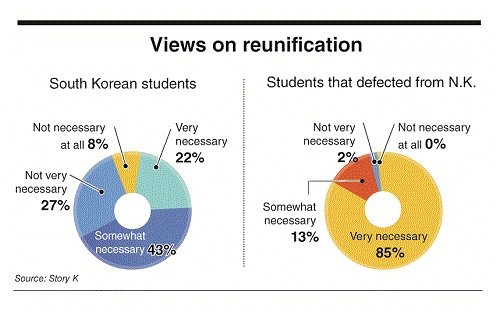College students who defected from North Korea feel the need for unification more than South Korea-born students, a survey showed Thursday.
The survey was compiled by Story K, a youth forum, by interviewing 257 native South Koreans and 180 North Korean defectors currently attending universities here over a seven-day period this month.

According to the report, 44 percent of South Korean students said they “mostly disagreed” with the statement that “unification should be realized as soon as possible regardless of whether it would burden the economy.” Some 18.7 percent said they “absolutely disagreed,” while 31.9 percent “mostly agreed” and 5.4 percent “absolutely agreed.”
On the contrary, 53.3 percent of young defectors absolutely agreed to the imminent need for reunification, followed by 33.2 percent of those who said they mostly agreed.
Students from the North also appeared to be more interested in reunification overall, with 66 percent and 31 percent of them saying they were “very interested” or “somewhat interested,” respectively.
The largest portion, or 46 percent, of the South Korean respondents were “somewhat interested,” but 37 percent said they were not that interested.
“The survey showed that students that defected from the North had higher interest in unification and recognition of its need compared to South Korean students. The results would be of meaningful reference in the future when the two Koreas eventually go through social integration,” Story K said.
While most South Korean students said reunification was “somewhat” (43 percent) or “not really” (27 percent) needed, defectors deemed it was “very much” (85 percent) or “somewhat” (13 percent) needed.
The majority, or 71.6 percent, of South Korean youths saw the need to wait until conditions mature for the two Koreas to reunify, as opposed to 53.9 percent of young defectors who said reunification should be realized as soon as possible at all costs.
All respondents, meanwhile, shared a similar perception on the process of reunification, with 47.5 percent of South Koreans and 46 percent of defectors saying it would be possible when the current North Korean regime collapses. Upon reunification, most native South Koreans (69.3 percent) and defectors (66.1 percent) said the two Koreas should be integrated into a system of liberal democracy. Some 15.2 percent of South Koreans and 16.7 percent of defectors said the systems of the two Koreas should be integrated with compromise.
With preparing the foundation for peaceful reunification being one of the key policies of the Park Geun-hye administration, the government has been moving to reinforce education regarding reunification from an early stage. A presidential committee for unification preparation was launched in July 2014, while Park has emphasized the government’s controversial reintroduction of state-authored history textbooks for secondary education was ultimately aimed at preparing for reunification by learning the “right” history.
Most recently, the Unification Ministry said on Tuesday that it would develop teaching aids to be used at child care centers and kindergartens from next year to educate toddlers and preschoolers of the need for reunification.
From news reports

